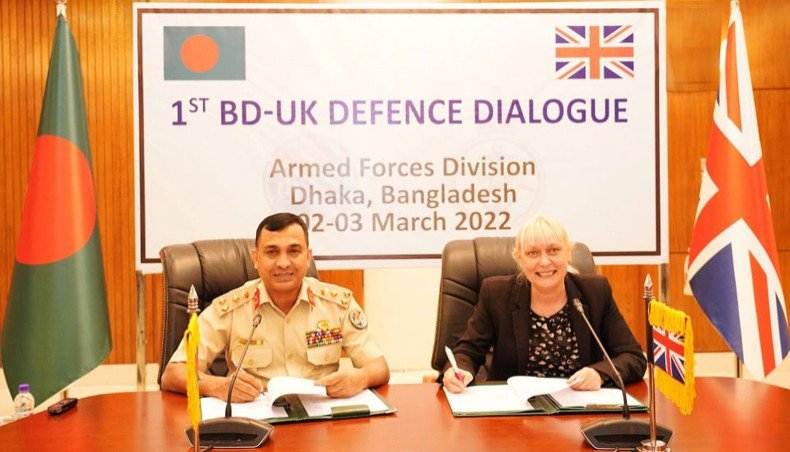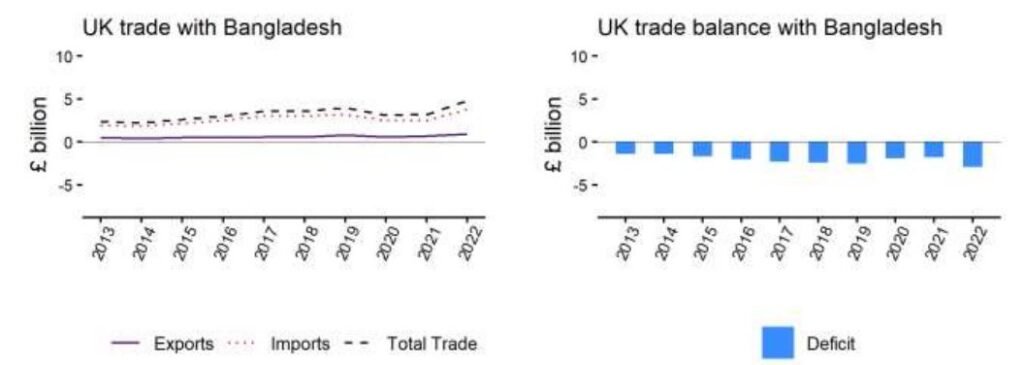Over the last decade, Bangladesh has experienced remarkable economic growth, leading to increased confidence and an outward-looking foreign policy approach. This shift aims to ensure the country’s security and prosperity amidst the maneuverings of major powers.
The United Kingdom was among the first European countries to recognize Bangladesh as an independent state on February 4, 1972. This recognition influenced other Commonwealth and Western nations to follow suit. Since then, the two countries have enjoyed warm bilateral relations, which have seen a particular strengthening since 2017 with the first-ever Bangladesh–UK Strategic Dialogue.
You Can Also Read: EVOLVING UK-BANGLADESH BILATERAL RELATIONSHIP
The bilateral relations between Bangladesh and the UK cover a wide range of areas, including defense, security, trade, and human security issues. Bangladesh’s geostrategic importance in the Bay of Bengal, coupled with its rapid economic growth over the past decade, makes it a crucial partner in maintaining shared peace, security, and prosperity in South Asia. Against this backdrop, it is crucial to assess the achievements and explore new avenues for harnessing the full potential of the ‘Brit Bangla Bondhon’ (Britain-Bangladesh Bond).
Strategic and Defence Cooperation
On September 12, 2023, the Foreign, Commonwealth and Development Office (FCDO) of the United Kingdom and the Ministry of Foreign Affairs (MoFA) of Bangladesh held their fifth UK-Bangladesh Strategic Dialogue at the Foreign Service Academy in Dhaka, Bangladesh.

The Dialogue encompassed the entire spectrum of the Bangladesh-UK relationship, including political and diplomatic ties, economic, trade, and development partnerships, as well as global, regional, and security matters.
The UK and Bangladesh welcomed the evolution of their bilateral relationship into a modern economic, trade, and security partnership, which advances shared global and regional priorities, such as combating climate change and addressing the Rohingya refugee crisis.
In March 2022, Bangladesh and the UK will hold their first-ever defence dialogue, as the two countries seek to elevate their bilateral relationship to a strategic level. During Prime Minister Sheikh Hasina’s visit to London in November 2021, the issue of defence procurement was discussed. UK–Bangladesh defence cooperation will aid in implementing the Forces Goals 2030.

Bangladesh has decided to purchase five naval ships from the UK to protect its extensive maritime frontier in the Bay of Bengal. This decision underscores the country’s strategic move to diversify its defence procurement from Asian countries to Western nations. During the 3rd Bangladesh–UK strategic dialogue in 2019, the UK officially expressed its ‘readiness’ to assist Bangladesh Air Force in obtaining higher-caliber multi-role combat aircraft from Europe and strengthening aviation security, particularly at the Hazrat Shahjalal International Airport, through ‘sharing of best practices, training, and capacity building’.
The UK also trains a significant number of Bangladeshi armed forces personnel annually at the Sandhurst Royal Military Academy, Royal College of Defence Studies, and Joint Defence Command Staff courses. The UK has provided substantial military and advisory assistance in establishing the prestigious Defence Services Command and Staff College and the National Defence College (NDC) of Bangladesh.
However, there is further scope for cooperation in counter-terrorism aspects, which require collective measures. Both countries have faced critical terrorist attacks in the past. Experience sharing, technical and logistical support, training, collaboration in identifying root causes, and increasing engagement in these areas are crucial for the two nations.
Trade and Investment
The United Kingdom is the second-largest foreign investor in Bangladesh. As of 2021, the outward stock of foreign direct investment (FDI) from the UK in Bangladesh stood at £816 million. This investment is part of a broader trade relationship between the two countries. The total trade in goods and services (exports plus imports) between the UK and Bangladesh amounted to £3.9 billion in the four quarters leading up to the end of Q3 2023. This figure represents a decrease of 13.6% or £611 million in current prices compared to the four quarters leading up to the end of Q3 2022.

Total UK exports to Bangladesh amounted to £610 million in the four quarters leading up to the end of Q3 2023. This figure reflects a decrease of 38.3% or £379 million in current prices, compared to the four quarters leading up to the end of Q3 2022.
Total UK imports from Bangladesh amounted to £3.3 billion in the four quarters leading up to the end of Q3 2023. Bangladesh was the UK’s 52nd largest trading partner in the four quarters leading up to the end of Q3 2023, accounting for 0.2% of total UK trade. In 2023, around 800 UK VAT-registered businesses exported goods to Bangladesh, while around 1,100 UK VAT-registered businesses imported goods from Bangladesh.
Bangladesh is also the second-largest recipient of UK’s development assistance after India. Since independence, total UK assistance to Bangladesh has exceeded £3 billion. The UK has been providing duty-free export facilities to the country as it is a UN Least Developed Country (LDC). However, Bangladesh’s graduation from the LDC status by 2026 poses several challenges to the country’s steadily growing economy. For instance, Bangladesh will no longer be eligible for Official Development Assistance (ODA) from developed countries, including the UK. Therefore, it is time to rethink their future economic partnership.

In the latest Strategic Dialogue, the UK reiterated its commitment to continuing to provide duty-free, quota-free access to the UK market until 2029. However, the potential for specific preferences like a free trade agreement (FTA) or a preferential trading agreement (PTA) needs to be considered to maintain the robustness of bilateral trade and investment. Furthermore, for the development transition, a vast amount of investment opportunities have been created in areas such as infrastructural development, technological support, and hundreds of economic zones. However, Bangladesh must ensure a smooth investment environment to harness the full potential of investment opportunities from the UK.
Expatriate Bangladeshi Community
Due to the former colonial ties and the availability of cheap foreign labor, the United Kingdom has become one of the largest hubs for the Bangladeshi population in the Western world. The diaspora, which now stands at around 0.6 million, remains a crucial link in the growing political, economic, and cultural relations between the two nations. Currently, there are approximately 100 British-Bangladeshi councilors and 4 Members of Parliament (MPs) in the UK. The community operates over 10,000 Bangladeshi restaurants, with an annual turnover worth £4.5 billion.
For Bangladesh, the UK has been one of the top sources of remittance. In the second quarter of FY22, the United Kingdom contributed 8.87% of the total remittance received by Bangladesh. Considering the total remittance inflow of USD 4831.23 million during that quarter, the UK’s contribution is significant.

Human Security Issues
Despite cooperation, the Rohingya refugee crisis remains a challenging area. Bangladesh has been hosting 1.2 million Rohingya refugees since 2017. With the deteriorating political situation in Myanmar, the hope for their safe and dignified return has been diminishing. The UK government has been active in raising and coordinating the issue at the UN Security Council and creating pressure on Myanmar. Both countries need to work with the international community, including ASEAN and the UN, to resolve this protracted crisis.
Since 2017, the UK has provided £350 million to support the Rohingya and Bangladeshi host communities. This assistance has included food, shelter, water and sanitation, healthcare, and protection services that are vital for women and girls in the camps.

According to the UN Office for Humanitarian Affairs Financial Tracking Service, the appeal is currently 15% funded (US$130 million). The UK is the third-largest donor.
As one of the most climate-vulnerable countries, Bangladesh is a global leader in climate adaptation and resilience, and the UK has actively aided in this process. Between 2008 and 2020, the UK helped install 249 solar irrigation pumps serving 6,062 farmers and protected 40,000 hectares of cultivable land from flooding. Around 27 million people in Bangladesh gained access to early warning systems for floods and cyclones with the help of UK funding. Furthermore, the UK is an essential partner in achieving the Sustainable Development Goals (SDGs) and the Delta Plan-2100. In the 4th Strategic Dialogue, both countries reiterated their commitment to climate action.
Challenges that Need Addressing
For Bangladesh to fully capitalize on its newfound geostrategic importance and achieve greater security and prosperity, it must address certain obstacles. These include tariff and non-tariff barriers, corruption, a low ranking in the ease of doing business index, and bureaucratic burdens. To avoid the ‘middle-income trap’ and ensure a smooth graduation from the Least Developed Country (LDC) status by 2026, Bangladesh requires the UK as an important partner. However, the UK’s reduction of funds for the Rohingya refugees raises questions about their commitment to one of the world’s most persecuted groups. Having recognized Bangladesh as a ‘critical stability provider’ in the Indo-Pacific region, the UK needs to vigorously support Bangladesh in that role. Therefore, both parties need to earnestly address the challenges in their bilateral relations for their mutual benefit.


